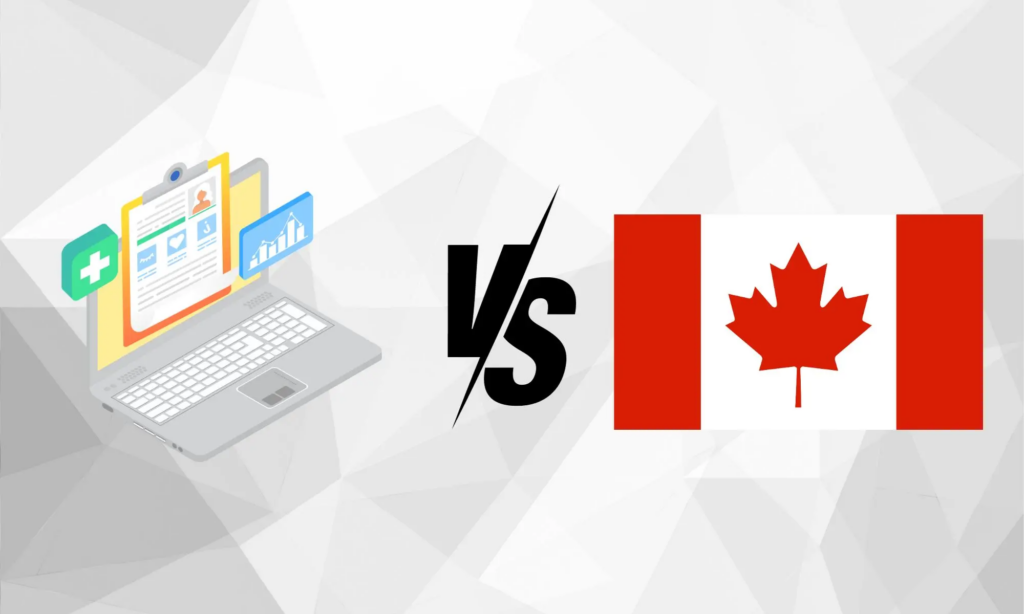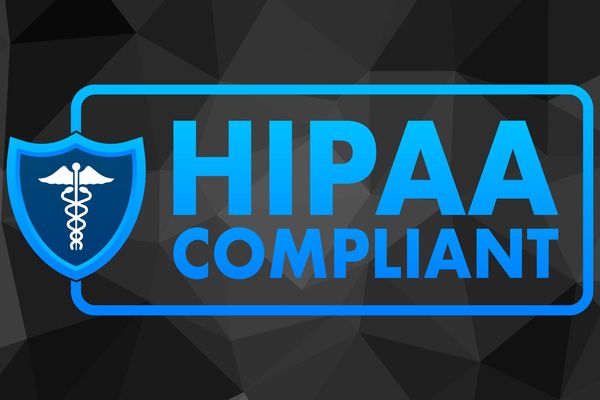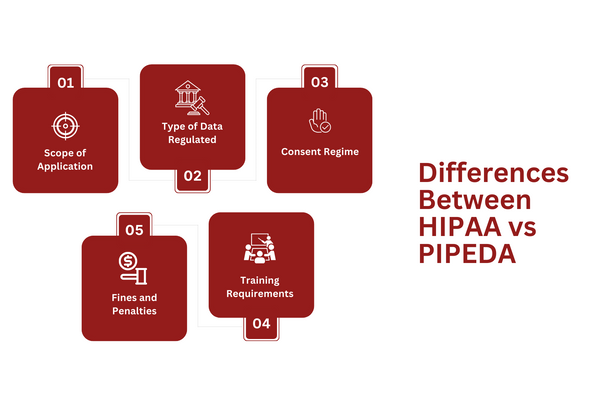
Are you curious about how America’s HIPAA compares to Canada’s PIPEDA? You’ve come to the right place.
If you have customers in multiple countries, you may assume that complying with the data protection laws of one country makes you compliant with the equivalent laws of another.
Not only is this assumption wrong, it can damage your compliance program and put you at odds with regulatory authorities. This is exactly the case with HIPAA and PIPEDA.
To help guide your compliance efforts, we’ve compiled the most significant similarities and differences between HIPAA vs PIPEDA in the guide below.
Let’s dive in!
Key Takeaways
HIPAA is a US federal law that regulates Protected Health Information (PHI) and sets out rules for how healthcare-focused businesses must handle this data responsibly.
PIPEDA is the main Canadian data protection law that sets rules on how private-sector businesses in Canada must handle personal information securely.
While both laws are designed to protect the data of their residents, their scope, regulated industries, and compliance requirements differ in significant ways.
What is HIPAA?
What is HIPAA.jpg

HIPAA stands for the Health Insurance Portability and Accountability Act. It’s a world-renowned federal law that shapes how healthcare data — officially known as Protected Health Information (PHI) — is handled in the United States.
To clarify, PHI is essentially any information that identifies a person and relates to their health. Typical examples include patient records, lab test results, insurance policy numbers, billing information, etc.
Enacted on August 21, 1996, HIPAA became effective on April 14, 2003. It primarily aims to give US patients control over their PHI while ensuring it remains secure and confidential.
To do this, HIPAA sets out strict standards for all organizations (even outside the US) that deal with US patient health data. Specifically, HIPAA applies to:
Covered Entities: People and businesses that handle PHI directly, including:
Healthcare providers (such as hospitals, doctors, dental clinics, nursing homes, pharmacists, etc.)
Health plans (such as health insurance companies, Medicare, HMOs, etc.)
Healthcare clearinghouses (such as community health management information systems, billing services, etc.)
Business Associates: People and businesses that provide services involving PHI to covered entities. They include but aren’t limited to:
Lawyers
Accountants
Email hosting services
Healthcare claims processing companies
Records storage or destruction companies
Note: HIPAA also applies to subcontractors who offer services to existing business associates.
To ensure conformity with the law, HIPAA compliance is regulated by the Office for Civil Rights (OCR) under the US Department of Health and Human Services (HHS). They oversee compliance through audits, investigations, and, if necessary, enforcement actions.
What is PIPEDA?
PIPEDA (Personal Information Protection and Electronic Documents Act) is the primary data privacy law that regulates private-sector businesses in Canada.
Since becoming law on April 13, 2000, PIPEDA has been the central legislation shaping how private-sector businesses handle people’s personal information in the Great White North.
At its core, PIPEDA aims to balance Canadian citizen’s right to privacy with the need for businesses to collect, use, and disclose personal information. To do this, PIPEDA places control in consumers’ hands while emphasizing transparency and accountability for businesses that handle their data.
So, who does PIPEDA apply to? All private-sector organizations across Canada (including non-profits in limited circumstances) are subject to PIPEDA.
Specifically, if your business collects, uses, or discloses Canadians’ personal information for commercial activities, PIPEDA applies to you regardless of your location.
When it comes to enforcement, the Office of the Privacy Commissioner of Canada (OPC) is the watchdog of PIPEDA compliance. They ensure adherence to the law, investigate potential violations, and, where necessary, impose penalties.
Differences Between HIPAA vs PIPEDA
Differences Between HIPAA vs PIPEDA.png

While both HIPAA and PIPEDA share the goal of protecting consumer privacy, they include notable differences you must carefully consider if your business falls under their scope.
Let’s go over the most significant ones:
Scope of Application
The most obvious difference between these frameworks is that they’re created for different regions and industries. HIPAA applies to healthcare-focused businesses that handle the PHI of US residents.
On the flip side, PIPEDA applies to private-sector businesses (regardless of their industry) that handle the personal information of Canadians.
Essentially, while HIPAA is tailored for the US healthcare sector, PIPEDA is designed for a more general application — much like the GDPR protects personal data regardless of industry.
Type of Data Regulated
When it comes to the type of data regulated, HIPAA’s scope is much narrower compared to PIPEDA.
HIPAA regulates PHI (also known as individually identifiable health information). This ranges from a person’s medical history and treatment plans to their demographic information and health insurance details.
In contrast, PIPEDA’s scope is broader, covering all types of personal information, including PHI. Think of it this way: All PHI is personal information, but not all personal information is PHI.
Practically speaking, personal information includes:
Standard personal data (such as names, home/email addresses, phone numbers, etc.)
Sensitive data (such as racial/ethnic origin, religious beliefs, sexual orientation, etc.)
Online identifiers (such as cookies, IP addresses, browsing histories, etc.)
Consent Regime
HIPAA generally adopts the opt-in consent regime. This means consumers have to explicitly say “yes” before you can collect, use, or disclose their PHI.
PIPEDA, on the other hand, generally supports the opt-out consent regime. In this model, consent is assumed unless the consumer actively objects.
Picture a newsletter sign-up form with the consent checkbox ticked by default. To reject the terms, consumers would have to untick that box. That’s an opt-out consent model.
With that said, PIPEDA requires explicit consent in some instances, particularly if:
You’re dealing with sensitive personal information.
There is a high risk of significant harm to consumers.
Your purpose for using personal information falls outside consumers’ “reasonable expectations.”
Training Requirements
Under HIPAA, all businesses must conduct periodic compliance training for all employees who handle PHI.
This training keeps employees up-to-date on the most effective security measures for PHI. And while HIPAA doesn’t specify how often you must conduct this training, a reasonable frequency would be yearly.
On the other hand, PIPEDA doesn’t explicitly require formal training. That said, conducting periodic privacy awareness training for your employees is a best practice for effective compliance.
Fines and Penalties
HIPAA violations can result in significant consequences depending on how severe the violation is, whether or not it was intentional, and how quickly it was corrected.
According to the HHS Office for Civil Rights, HIPAA violations invite the following:
Civil penalties – ranging from $100 to $50,000 with a maximum annual penalty of $1,500,000.
Corrective Action Plans (CAP) – a detailed plan to fix violations and prevent future offenses.
Criminal charges – maximum fine of $250,000 and up to 10 years in prison administered by the US Department of Justice
In contrast, PIPEDA violations attract penalties of up to $100,000 CAD for each violation. Moreover, affected consumers may be entitled to compensation for damages from the violation.
Similarities Between HIPAA vs PIPEDA
Despite their differences, HIPAA and PIPEDA share several fundamental similarities, reflecting their goal of protecting consumer privacy.
These common threads build a foundation for businesses that operate in both jurisdictions. Briefly, they’re as follows:
Data Security Requirements
HIPAA and PIPEDA require businesses to implement robust security measures to protect data from unauthorized access, use, or disclosure.
In particular, security measures should include:
Technical safeguards (such as data encryption, firewalls, multi-factor authentication, etc.)
Physical safeguards (such as CCTV surveillance, locking computers when not in use, deleting data promptly, etc.)
Administrative safeguards (such as appointing a HIPAA compliance officer, limiting data access, training employees, etc.)
Data Breach Notifications
In the event of a data breach, both HIPAA and PIPEDA require businesses to notify affected consumers and relevant authorities promptly (unless a valid exception applies).
The time frames vary slightly, with HIPAA requiring breach submissions within 60 days and PIPEDA using the phrase: “as soon as feasible.” In any case, the underlying principle of timely and transparent communication remains consistent between both laws.
Transparency and Openness
Both HIPAA and PIPEDA emphasize the importance of transparency in data management.
To this end, both laws require businesses to provide a clear and easily accessible privacy policy that explains how they collect, use, and disclose their respective data types (i.e., PHI and personal information).
Record-keeping Obligations
Like many other data protection laws, both HIPAA and PIPEDA require businesses to maintain accurate, up-to-date records of their data management practices.
At a minimum, your records should include details on your data collection, storage, usage, and disclosure practices. It should also include other relevant details like proof of consent, privacy complaints, data breaches, etc.
Consumer Access and Correction Rights
Consumers have several privacy rights under HIPAA and PIPEDA, including the right to access and correct their information.
This means your business must provide a system for consumers to exercise their rights by submitting what is known as a Data Subject Access Request (DSAR).
Closing
The steady stream of data protection laws popping up worldwide makes compliance an intricate endeavor. HIPAA and PIPEDA are just more examples of this complex system.
To navigate these delicate regulatory waters, it’s a smart move to outsource your compliance to dedicated, reliable professionals.
At Captain Compliance, this is our specialty. From conducting risk assessments to drafting transparent policies, we’re at the forefront of your compliance strategy.
With us by your side, you can rest easy knowing that your business is well-equipped to meet its data privacy obligations — freeing you up to focus on your core business goals.
Ready to achieve cross-jurisdictional compliance with ease? Get in touch today!
FAQs
Why should I be concerned about HIPAA and PIPEDA if I operate in both the US and Canada?
Failing to comply with HIPAA and PIPEDA (if you fall under their scope) can result in significant fines, reputational damage, and other legal consequences of one or both laws.
Each law has its own set of requirements, and it’s important to understand the nuances of both to ensure effective compliance across borders.
See also: PIPEDA vs GDPR (Major Differences)
What are the main differences between HIPAA and PIPEDA?
HIPAA’s scope is narrower, focusing specifically on healthcare data (PHI), while PIPEDA covers a broader range of personal information, including PHI.
HIPAA also has stricter rules when it comes to consent and demands comprehensive training for employees, while PIPEDA doesn’t explicitly require employee training.
See also: PIPEDA vs. CCPA (Major Differences)
What are the key similarities between HIPAA and PIPEDA?
Both HIPAA and PIPEDA aim to safeguard personal health information (PHI) and establish guidelines for its collection, use, and disclosure.
They also emphasize consumer control over their data and require effective security measures to guard against unauthorized access, use, and disclosure of PHI.
Learn how to protect your business with Data Privacy and Compliance Services
How can I ensure compliance with both HIPAA and PIPEDA?
A few of the most important compliance steps for both HIPAA and PIPEDA (and many other privacy laws) are as follows:
Conduct regular risk assessments
Train employees on data protection
Implement robust data security measures
Maintain transparent privacy policies and practices
Want to learn more about compliance steps? Read our Corporate Compliance Guide